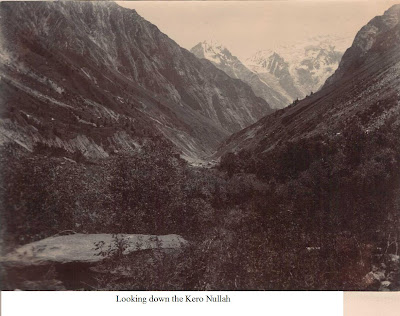The shikaris then went with Neve back a little to the left, where there seemed to be a possible way across the bergshrund downward. Meanwhile I went to forage for something to eat in the kilter, and got a hunk of bread, and one for Neve. I then went to see what the shikaris were doing when I met the coolie who hadn’t wept coming up, and he called out to the coolies, who began at once to pick up their loads.
Wondering if a route had been found, I went on, but almost at directly met Neve who said “we must go back.”
The coolies had already started, so we followed and got hold of the tiffin basket and secured a slice of bread and jam each, and one for the Khansamah. Neve was pretty well done, having had nothing since Choti Haziri. at 6am, except 2 Kola biscuits, and had been hard at it all day and it was now nearly 5 o’clock.
It was impossible for the coolies to camp out on the snow without fire or shelter, or some further exploring might have been done. But considering all the crevasses were open, and there were several hundred feet to get down to the glacier, and then 3 or 4 miles across the glacier to the camping place at Haigatum - at the side of the Hispar -I think the chances were against our getting through.
There was nothing for it but to go back, and we started up the slopes. When we reached the steep slope, Neve and I roped up with the guide, the Khansamah being looked after by a shikari. This time I got both hands to by khud stick (Alpine stick), so was all right. On getting back through the cornice there was a general congratulation between the shikaris, who also shook our hands, evidently very delighted to have brought us safely back. One shikari was especially moved, and knelt down by Neve and shaking his hand and almost crying, saying he would have cut his own throat if we hadn’t got back all right. The coolies too embraced one another as they got through the tunnel out on to safe ground.
We descended to the rocks where the old shelters were, and there were further congratulations.
It was now about 6 o’clock, and the men said the snow would be too soft for us to get back to Stiatbu Branza, so it was decided to stay where we were for the night. There was no room to pitch a tent, so Neve and I put our beds under a rock. A there was no fire wood, the coolies broke up two of the load kilters for the cook to make a fire with, and we dined off mulligatawny soup, Irish stew and cocoa.
Considering it was about 17,000 ft, it wasn’t very cold. The coolies lay about on the rocks and covered themselves up with the tent flies. They groaned a good deal during the night, but that was more or less to their dinner of raw meal soaked in water. It was a lovely moon-lit night, and I lay awake a good deal of the night looking across and down the long vale of snow and at the range of broken peaks on the other side, all draped in shining white. I may never see such a scene again.
Early next morning we were up and off, the snow being crisp and hard, down the valley to Stiatbu Branza. It was a cloudless morning, and the view down the Kero glacier and valley magnificent. Then on across the two side glaciers, finding a better route through the crevasses that when we came up, to Ding Branza, arriving there at 10.15 (2½ hrs and about 5 miles from the Nushik La. Here we rigged up an umbrella on a pole and sheltered under it waiting for breakfast. Left at 11.30, crossed the Kero Glacier and reached Kutche Branza at 2.10.
Not having had a wash since Wednesday morning, I essayed a bathe in the little lake. Neve sketched the while. When the coolies arrived, we went on another hour to Harimuch, where some trees and shrubs are, where we breakfasted on the way up, and there camped.

